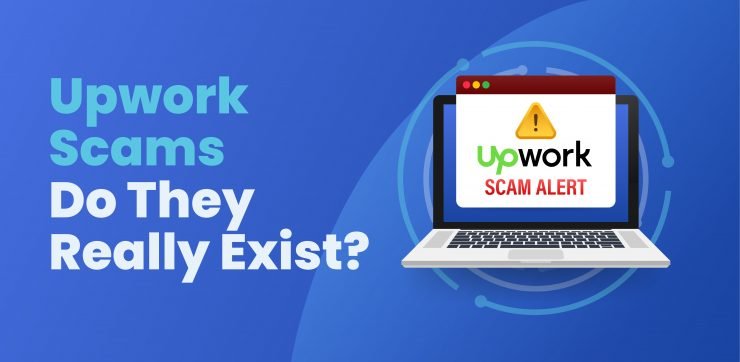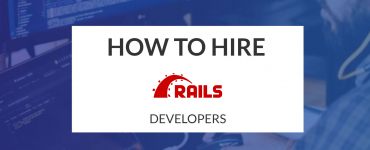Unfortunately, it doesn’t matter where you turn; scammers will be lurking to take advantage of whomever they can. It’s vital to stay aware of scams and to trust your gut when something doesn’t feel right.
Upwork can be great for freelancers and those looking to hire a freelancer; however, it can also be fraught with those looking to turn a good thing sour. In this guide we'll review how safe Upwork is. We'll also discuss common Upwork scams, and share ideas on how to protect yourself.
We offer this website completely free to our visitors. To help pay the bills, we’ll often (but not always) set up affiliate relationships with the top providers after selecting our favorites. However, we do our best not to let this impact our choices. There are plenty of high-paying companies we’ve turned down because we didn’t like their product.
An added benefit of our relationships is that we always try to negotiate exclusive discounts for our visitors.
Is Upwork Legit?
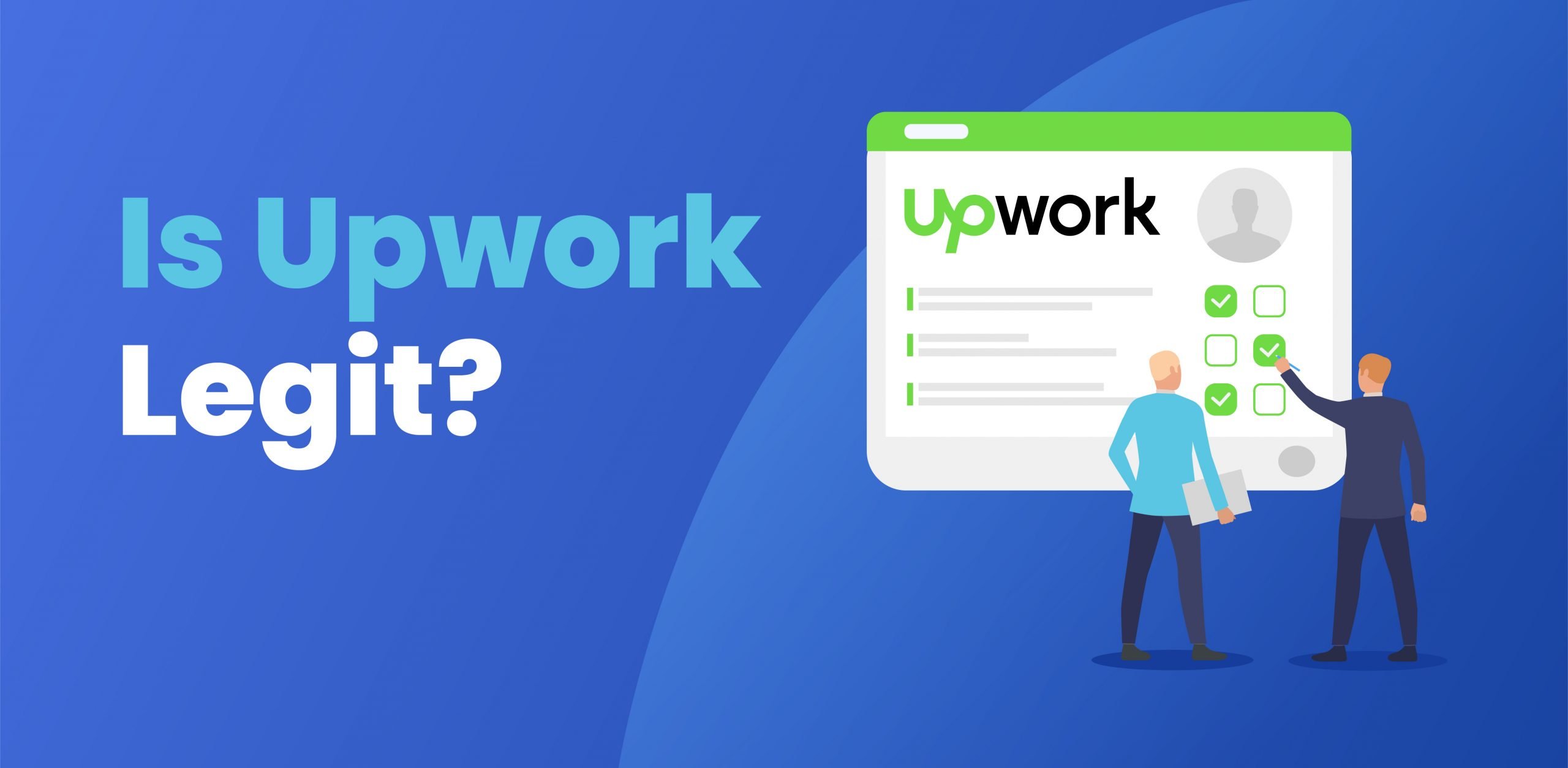

For Freelancers
The short answer is YES. Upwork can be great for a freelancer looking to make a bit of a secondary income or even a freelancer looking to do full time work. There are plenty of people who succeed and make a living off Upwork.
Being successful on Upwork really comes down to you being diligent in finding work, providing the best product, and avoiding scams. There are plenty of great job opportunities on Upwork. Being able to determine your own pay is a plus as well.
There are of course complaints about the platform, such as charging hefty fees on its freelancers.
For Clients
Again, the short answer will be yes. There are plenty of great freelancers looking for legitimate work on Upwork. You can find skilled workers willing to do your project at a cost that works for you. However, there will be scammers working this direction as well. Reviews and Upwork's identity verification system really helps with this.
There is a nearly limitless pool of talented freelancers on Upwork. Some a great, some are good, some are not so good, and others are straight-up scammers.
Is Upwork Safe?
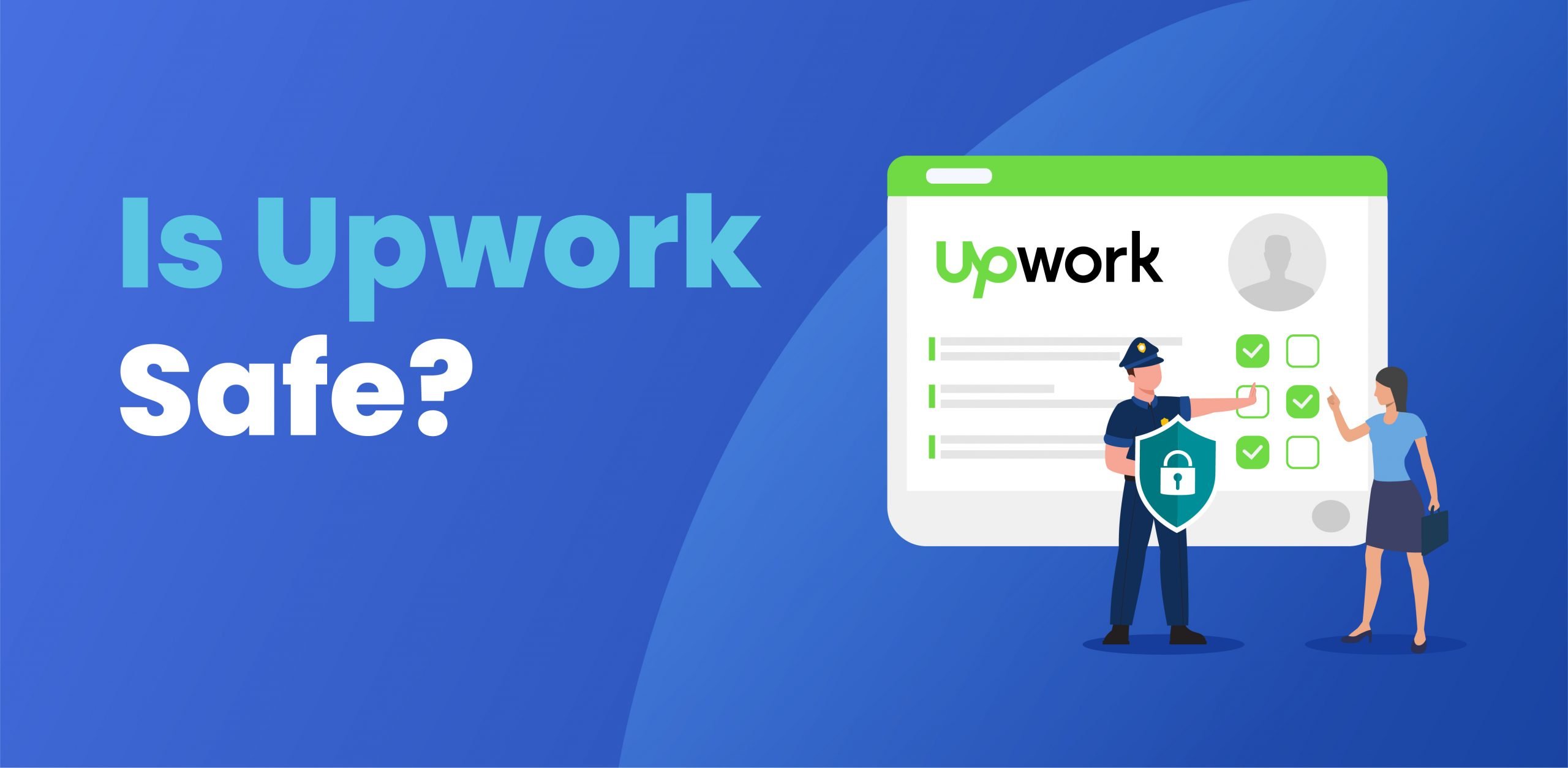

Again, the short answer is YES. If Upwork was completely a scam or unsafe, then it would fall apart quickly. Let's just say there's a reason that they went public in 2018.
Phishing scams have been plaguing emails pretty much since its inception, but that doesn’t mean emails are not legitimate. It comes down to being aware and not believing in something that sounds too good to be true.
Now, it’s important to realize that doesn’t mean Upwork is 100% safe. There are dangers. Just like all things in life, there are going to be dangerous elements and people looking to exploit them, but by being careful, it can be extremely safe.
Common Upwork Scams
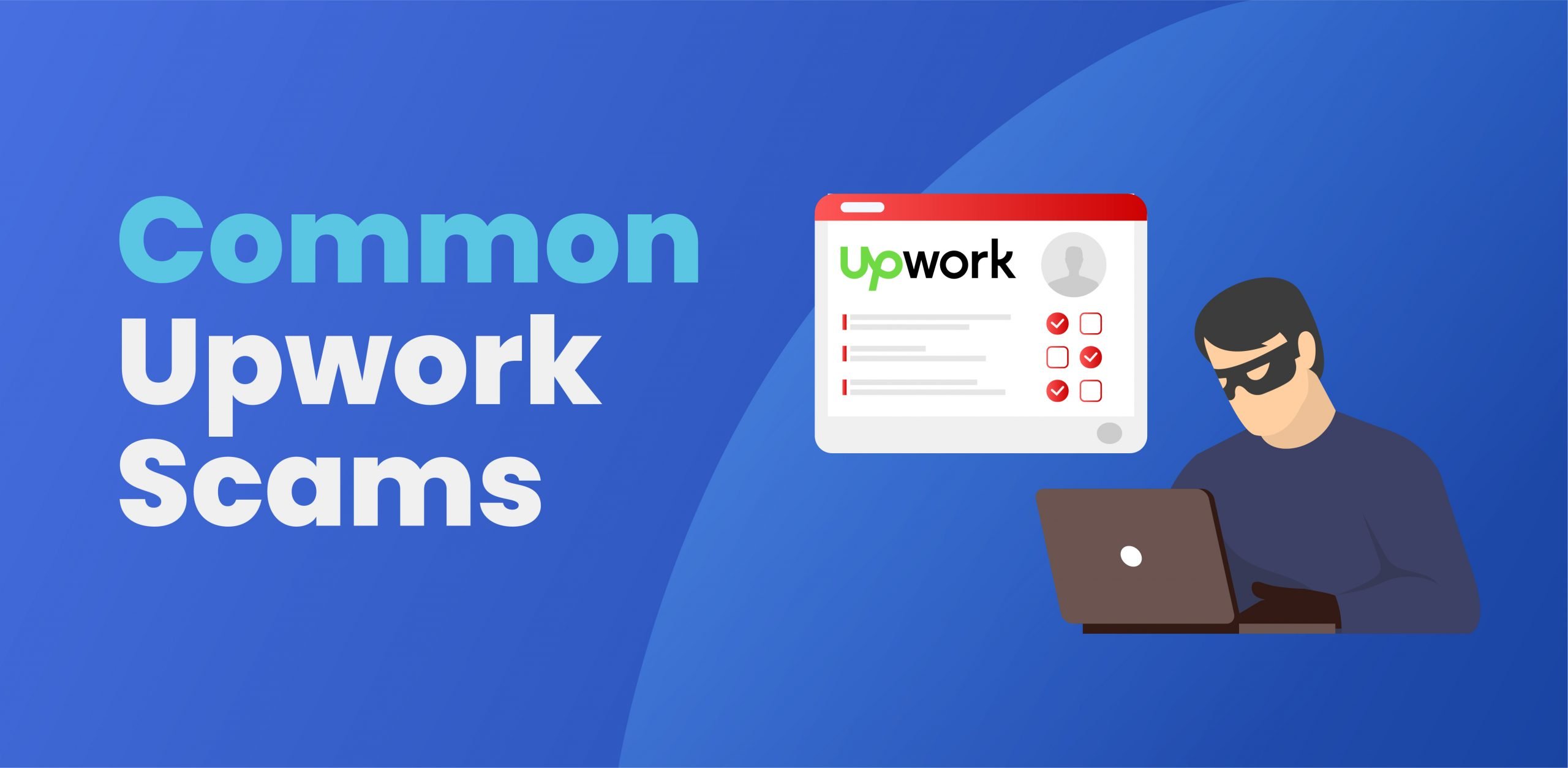

For Freelancers
There are quite a few ways that scammers will try to take advantage of freelancers. There are scams attempting to get your money, your information, or your labor for free.
Updated Check Scams
Check scams have been around for quite some time. In this case, the client might send you a check for “expenses” or to pay another party. You deposit the check, and then transfer the money usually via an app like Venmo or CashApp. By the time your bank catches that the check is fake, you’ve already lost the money. You end up paying the bill.
Another form of this is for them to “overpay” you with a check, and then when they ask for you to send back the difference, you’ll end up losing out when their original check is determined to be fraudulent. However, you’re still out on that “difference.”
Information Theft Scams
Our personal information is profitable. Some scammers will post fake job listings and then request a whole heap of personal information from you. They will ask for your address, contact information, and some even go as far as saying they need your social security number for their records and verification. The more information they can draw from you, the more profitable it is for them and the more damaging it is for you.
Pay to Work Scam
Sometimes a client will ask you to pay them for access to a program or material. It might feel like a necessary investment, but they shouldn’t be asking you to pay anything. Usually when this occurs, they will take your money and move onto their next victim. This is especially alarming if they ask you to pay them outside Upwork.
Free labor scams
It’s not uncommon for a client to ask for a “sample” project before hiring you, but if they are asking for a “sample” that is a short but complete assignment, they might be looking for you to work for free. That short “sample” might be their end goal.
For clients
Not all the scams target freelancers. There are many that target clients as well.
Receiving plagiarized work
Anyone who has taken an English 101 course in college has heard the term plagiarism, and this isn’t something that only takes place in the confines of a classroom. Unfortunately in the real world, you don’t just get a zero on the assignment, instead you get served with a lawsuit. You may not even be aware that the work is plagiarized from someone else’s copyrighted work. You pay that freelancer, and then a few weeks or months later you’re being notified that your website has plagiarized material on it.
Payment scams
This one is pretty easy to recognize. If the freelancer asks for payment outside of Upwork, that is an immediate red flag. Not only does it go against the Upwork terms of service, it opens you up to the possibility of getting scammed. Usually if a freelancer wants to get paid outside of Upwork it’s because they want to avoid Upwork taking their hefty cut, but this leaves you open to the possibility of them taking the money and running.
Another method a scammer might use is asking for payment before they officially accept the offer. Sure they might really need the money right away, but this puts you in a tricky position as they can once again take the money and run.
Information scams
This is a type of scam that can be conducted from both ends. A freelancer might try to pull more identifying information from you than what they really need to complete the job. They might claim that it’s for “verification” purposes. It’s reasonable with the threat of the client being a scammer, but they really don’t need all that much from you. The billing should be occurring through Upwork, so they don’t need anything along those lines. Be wary of what information you give your freelancer.
Sold accounts
This is a new and rising problem with Upwork. This is where people with reputable accounts sell off their account to other users. This really hurts everyone using Upwork as even those with the best reputation can be compromised. However, most people who are doing well on Upwork are not going to be willing to sell off their account, but it does happen. This can be scary because in order to complete the project, you might have to give them access to sensitive information that they could then steal.
Also Read: Fiverr Scams and how to avoid them
How to Identify and Protect Yourself from an Upwork Scam
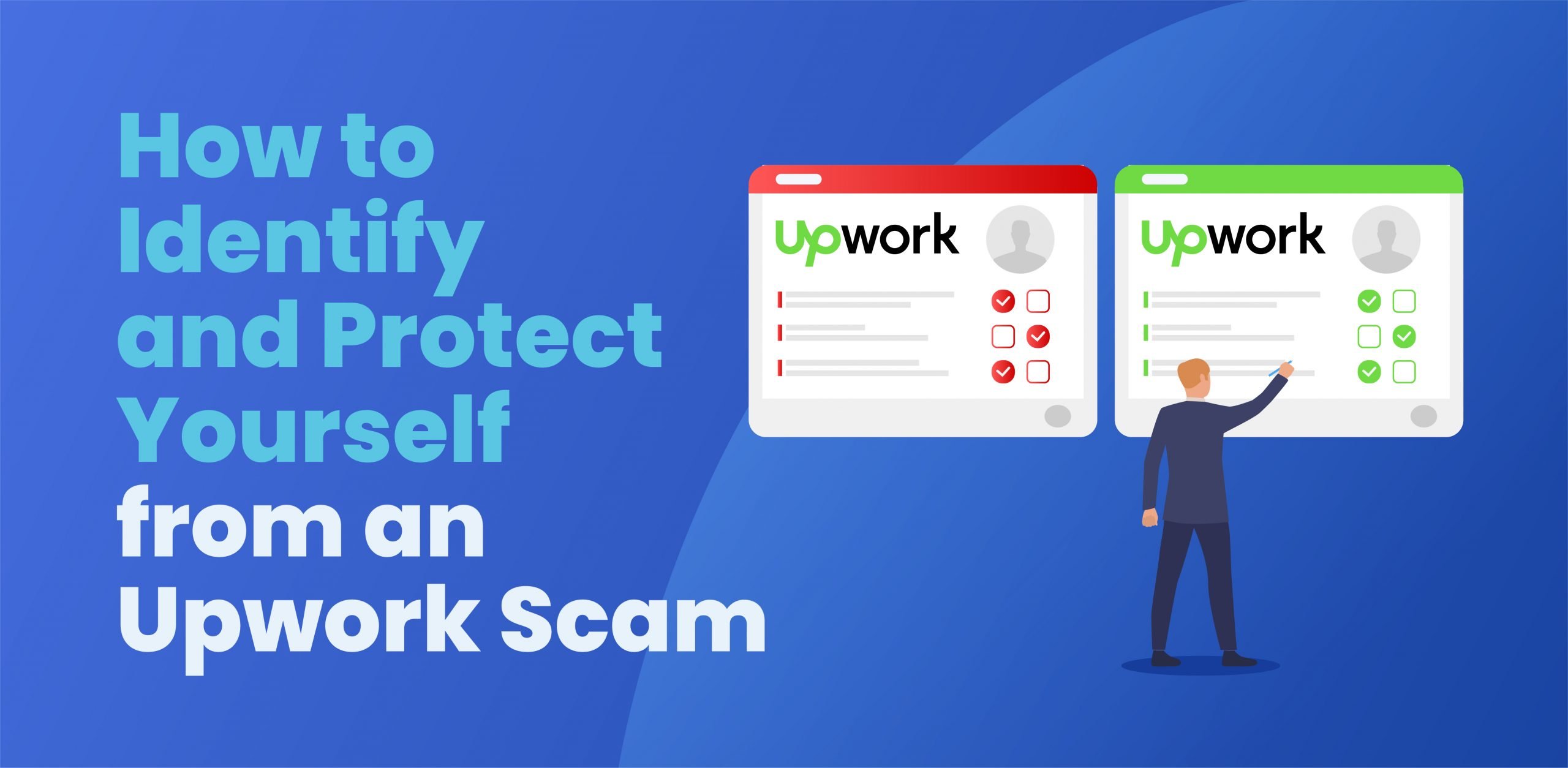

Upwork can be wonderful for both freelancers and clients. There is a plethora of talent on the site and there are plenty of happy customers. The best thing you can do to protect yourself is to be aware.
Whether you’re a freelancer looking to avoid a scam or a client looking to insure you’ve hired the best candidate, there are quite a few steps you can take to protect yourself.
For freelancers
Remember that if it sounds too good to be true, it probably is
It might seem like you’ve found the best opportunity around. They want to pay you more than what you were even asking and the work isn’t all that hard. Sounds great, but it’s probably not. You really need to critically think about what is being offered. Don’t let the dollar bills blind you to what might actually be going on. Scammers thrive off getting you to believe in something that sounds too good to be true.
In the freelancing world, no one is going to look out for you other than yourself. That’s the price of being a freelancer. You get no “boss,” but you only get the protection you can provide to yourself.
Keep everything in Upwork
It can be tempting to take a payment outside of Upwork to avoid them taking their large cut, but it also takes you out of the protection of Upwork. You will be violating the terms of service as well. In addition, you should keep as much of the communication through Upwork so that way there is a paper trail that leads back to them. Sometimes, it might be easier to have a phone conversation, but be careful they don’t push you away from working through Upwork. This can lead to exposing yourself to scams.
Don’t ever meet with them in person or travel somewhere to complete the job. These are massive red flags that should alarm you.
Don’t hand over your identity
As mentioned above, clients don’t need all that much information from you. Sure an email is okay, and if you feel comfortable sharing a phone number, you can, but they don’t need your address or much of your personal information.
Never pay them
This one is simple, if they ask you to pay them for anything, just turn away. A client shouldn’t be requesting payment from you. If they want to give you a check, reject it. All payments should come through Upwork. Yes, you might need to buy supplies to get the work done, and they want to pay for it, but don’t pay for anything until the money is secured in your account.
For Clients
Trust reviews
Yes, some reviews are going to be biased, but they will often alert you to the kind of work you can expect from a freelancer. If they have low reviews, move on.
Check for plagiarism
Always run whatever written work you receive through a plagiarism checker such as Grammarly. This will help make sure that you are getting original work. The sooner you discover this, the quicker things can get resolved and the freelancer be held accountable.
Don’t give out sensitive information
The freelancer doesn’t need your full identity any more than you need theirs. As long as the payment method is verified on your end, that’s all they need. It’s appropriate to give them information about the business and anything they need for the project, but be wary of a freelancer asking for more than they really need.
Hire slow and fire fast
Carefully vetting applicants is key. It can be tempting to click a couple buttons and hire someone, especially for urgent work. Take a step back and breathe.
I highly encourage hopping on a video conference call. If they can't make the time to do this, or start coming up with excuses, move on. If the face, matches the photo, that's your first good sign. Beyond that, really get to know the freelancer before handing them the keys to your project and wallet.
As a general rule of thumb, treat freelance hires the same way that you would treat a regular salaried employee. Interview them. Assess their skills. Start with some small projects to see how they communicate and to view their work product. If they suck, cut em' loose. There's plenty of freelancers in the Upwork sea.
How to Report a Scam Job on Upwork
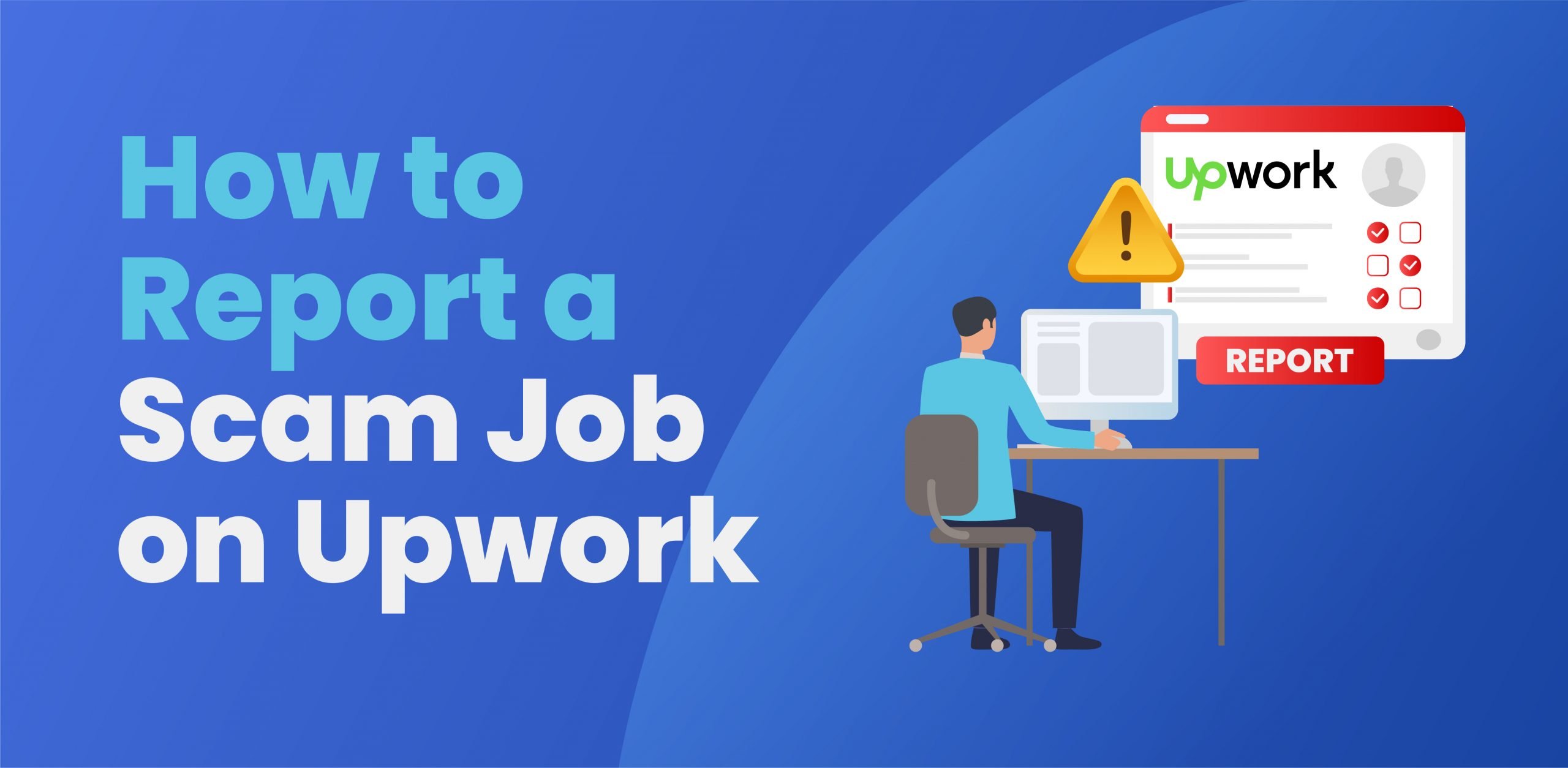

Upwork wants to catch these scammers as much as you want to avoid them. Scammers are bad for their business model. Because of this, they make it fairly simple to report it.
You can check out their full guidelines for submitting a flag.
Every job has a “flag as inappropriate” option at the top right hand corner, so utilize this tool. You might be saving someone else a lot of time and money.
For clients, it’s easy to flag a profile as well.
Once something has been flagged, Upwork will investigate it. These tools are meant to protect everyone, so if you see a scam, don’t just avoid it, report it!
How I Got Scammed on Upwork… Twice
One of the reasons why I decided to look into Upwork scams is because I have personally been taken for a ride…
Twice.
From my personal experience, both times where I have been “scammed” have been when trying to hire a developer. Thankfully, I've learned a lot since these experiences happened and I now know how to hire quality talent while mitigating risk.
My gut feel says that the types of scams I experienced tend to happen more when hiring programmers because the scammers think that people won't be smart enough, or know code, therefore, they'll be able to get away with doing some shady stuff.
The first time…
The first Upwork scam I experienced was significantly more blood-boiling than the second. This was mainly because it was a little harder to spot. Plus, I was still naïve in thinking that the platform was all sunshine and roses.
To summarize, I hired a seemingly good programmer – let's call him Billy Kidd – to work on developing a custom web application for our business. When I say seemingly good, he did a couple of small test projects for me and had good reviews. His identity was also verified. For the first few months, things were going really smooth. That was until we got to the point where we had to go live and I started finding a ton of bugs in the app that Billy had developed for us, primarily with the payments system.
We were having issues getting subscriptions for our software to update. So, I re-shared access to our Stripe account and asked Billy to dig into it. Thanks to Stripe's two-factor authentication I got an email notification with information on the login attempt.
In the email, it shared the IP address and it's origin:
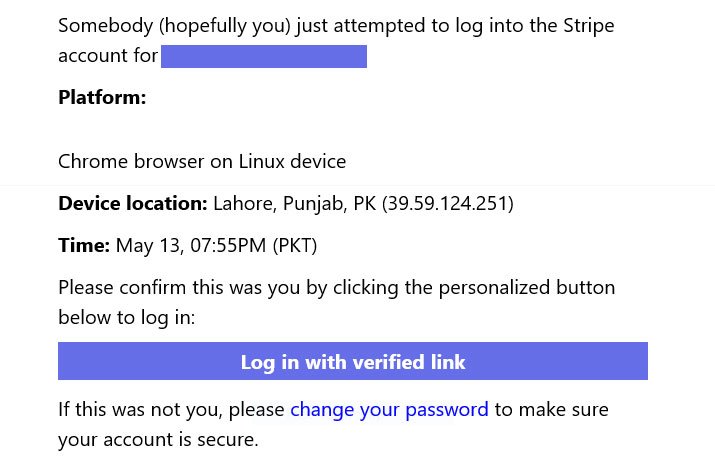

Pakistan?
Hmmm… That's weird… That's suspicious…
Don't get me wrong. There are quality developers and teams in Pakistan that provide great work at a fraction of a cost than U.S. based developers. But from my point of view, I “thought” I was paying Billy Kidd based in Atlanta, Georgia to do all of the dev work.
At that point, I pretty much knew that Billy had someone else working on the project, which was never communicated. Not the end of the world, but I needed to know more about what level of access had been provided, what type of version control system was in place, etc.
So, I confronted Billy Kidd and said, “Hey, what gives?” And he continued to lie to me. He said that it was him and that he spun up that IP address from a VPN. Yea, okay, dude. Why would you generate an IP based in a country in the Middle East when you, and your client, are both based in the United States? Eye roll.
At that stage, I asked one of my full-time developers to jump in and take a look at what was going on. In hindsight, I wish I had done it sooner. Because when he got in and took a look at the code and it was unfortunately a nightmare.
In his words, it looked like “Frankenstein” and was “completely indecipherable”, and that I was better off “starting from scratch”.
Bummer. Big-time.
So after that glowing review, I went back to Billy and gave him a chance to be upfront and come up with a solution. After a little back and forth, he ended up coming clean and said that he was over his head and was contracting just the backend stuff to a developer that he trusted. Whatever. We parted ways. I tried to get credited back the money I put in and filed a complaint with Upwork. We didn't get too far with Upwork support, and I was pretty much shit out of luck. It was an expensive learning process and set me back a few months on deliverables.
To make matters worse, a few months after I closed out the Upwork contract, I got a threatening email from the Pakistan developer, who I had still never even spoken to. Turned out that Billy didn't pay him. Fun.
So, the Pakistani developer started making threats to me saying that he would publish our code on the web. He called Billy all kinds of nasty names. I then was scrambling to change server credentials, Git access, and update as much sensitive information as possible. The damage was already done though.
Fortunately, things kind of “blew over”. To this day, I don't know what happened. Maybe Billy got a touch of guilt and actually decided to pay the guy for his horrible code. Maybe the other dev just gave up. Either way, it was a horrible experience and I wouldn't wish it on anyone.
The big learning experience I took away here was to always be on guard. Getting proper contracts in places and getting freelancers to sign an NDA is key. But at the end of the day, contracts only keep honest people honest. Scammers will still scam.
I'm thankful that I had another developer that I could trust. I can't understate the importance of having a second pair of trained eyes look at the work of your freelancer, especially when it's beyond your technical skillset. Even if it's just a friend or family member. Do it early and do it often. That way you don't get too far into a project and learn that what you've been paying for isn't complete trash.
The second time…
I somewhat recently experienced my second Upwork scam. And again, it was in the category of deception. Fortunately (but unfortunately), I had the experience from the previous scam, so I was able to catch this one much quicker, ultimately mitigating the damage and losses (only a couple hundred bucks).
It started with me being in a pinch. My lead developer was handling a personal matter and we had a bug on one of our apps pop up. So, I turned to Upwork and moved forward with a hire quicker than I would have really liked. Being in a pinch is never a good place to be when you have to hire someone. You make rash decisions that are more of a gamble than strategic, and well-thought out. Having a contingency plan, and an army of trustworthy, screened developers, is something that I've worked hard on since.
Anyway, I hired this new guy based on appearance. In other words, I only looked at his profile, credentials, and cover letter. Then, I talked to him via chat and was pretty happy with the communication. So, I pulled the trigger. Mistake. I guess the old saying holds true – you really can't judge a book by its cover.
I can't emphasize this point enough: always have a video conference with someone before hiring them on Upwork. It's not perfect at protecting you. BUT it can weed a ton of the “catfish” our early on. If someone can't get on a video call with you in 2021, the year after COVID and Zoom Boom, then pack your things and keep it moving. They probably have something to hide. Or they aren't who they say they are.
The first big red flag here was that this guy's profile said he was in California, but after checking LinkedIn and some of his social profiles, it said he was based in the Maryland area. Okay, people move. I get it. But then, something weird happened. The next day after I hired this guy, I got a bunch of frantic messages at 6:00am EST.
“Hey, can you pay me for the work I did via PayPal?”
More red flags…
- If you live in California, why are you messaging me at 3:00 AM your time like it's totally normal?
- Why are you asking me to pay you off of Upwork? And don't tell me it's about the fees because we've only worked on 2 hours worth of work.
Being a little wiser from my earlier experience with Upwork scammers, I got ahead of this. I sent a LinkedIn connection request to the guy who the imposter was presenting himself as.
I said, “Sure, I'll pay you on PayPal. But first, can you accept my LinkedIn request?”
Excuses about not being able to login.
“Okay, well if that's the case, we need to have a Zoom call, so I can talk to you.”
Radio silence. Typing. No typing. More typing. Backspace. Typing again. He was really thinking about this.
“Sir, I can't get on a Zoom call right now. I'm having audio difficulties.”
I closed the contract after that and then asked, “Is it audio difficulties, or is it because you aren't really who you say you are?”
To my surprise, the guy came clean after that question. He apologized and then attempted to justify using someone else's identity because he wanted to “earn my trust”. Sorry man, but if that was the case, then you should have just been upfront from the beginning.
Contract closed. Report submitted. See you later.
Summary
I still use Upwork today and I don't plan on abandoning it any time soon. I've found some absolute amazing freelancers on the platform that have helped me grow my business. But I've also had my share of troubling (annoying) experiences. Like anything, just be careful. Not all people in the world are good.
Upwork does what it can to connect businesses with solid freelancing talent, but they are largely hands off in the screening and selection process. For a better alternative and assurance that you'll always be working with top talent, consider a site like Toptal instead of Upwork. Or, if you're specifically in market for development resources, I'd recommend Upstack. Both of these options, provide better vetting, talent, and support overall to eliminate the risk associated with new hires.
There are a number of other freelance websites and Upwork alternatives out there. Some are better than others. But none of them are bulletproof and come with some inherent risk. Do your due diligence and start small to protect yourself. Good luck!














